
‘Today’s refugees are tomorrow’s Dutch citizens’
From virtual education to a friendly meeting place where refugees and Dutch students can get to know one another. Investing in refugees is in the interest of the whole of our society. This was the message of the students who opened the Academic Year of Leiden University on 5 September.
Integrating refugees
This is the first time in the 441-year history of Leiden University that the Academic Year has been opened by students. The students focused on the situation of refugees. Lesage Munyemana fled the civil war in Congo. He is now a biology student in Leiden and the founder of the new university Meeting Point. This will be a friendly and informal place located in the Plexus student centre, where refugee students can go for help and advice. The advice is provided by refugees who have been living in the Netherlands for some time and by alumni who can advise refugees on how to make their way in society. Other Leiden students are very welcome, Munyemana stressed, so that Dutch and refugee students can get to know one another better.
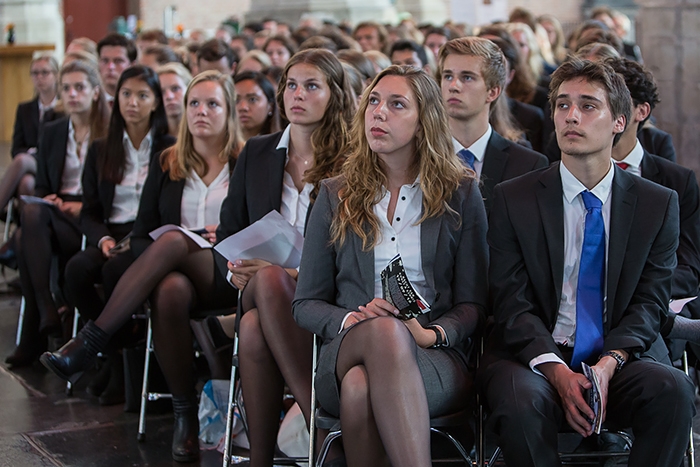
The audience in the Pieterskerk, amongst whom many students.
Meeting Place is a necessity
Looking back on his own past, Munyemana explained why such a meeting place is necessary. After he had fled the violence in Congo, he spent a number of frustrating years in asylum centres. It was only once he had been given a residence permit that ‘real life’ could begin and he could start his studies. But it still wasn’t simple. ‘No matter how talented and motivated refugees are, it is not easy. They have had to leave everything behind, and so are all too often prey to homesickness, which can slow down their study progress.’ This is why it is so crucial that refugee students feel at home, he explained. ‘If you help them to be successful in their studies, you will also be speeding up their integration in society. The refugees of today are the Dutch citizens of tomorrow!’
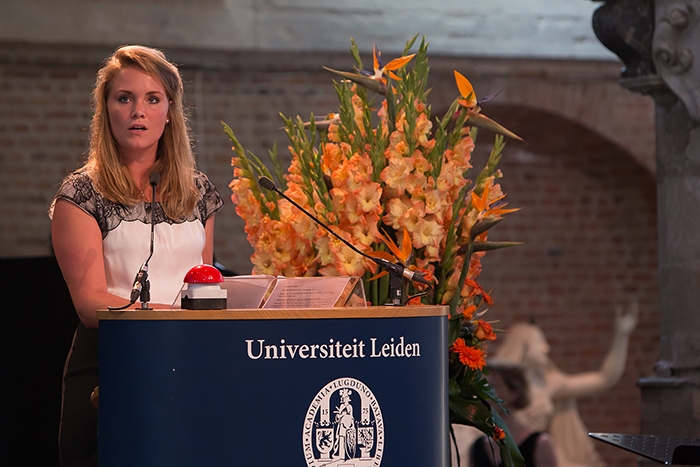
'Refugees can follow free online courses thanks to the MOOCs,' said Law student Celine van Es.
MOOCs for refugees
Many refugees do not have the opportunity to study at a university because they are being held in refugee camps, for instance. It is important that opportunities are created for this group, too. This was the message of Law student Celine van Es. She and fellow students drew up a recommendation for the Ministry of Education, Culture and Science – an assignment for the Leiden Leadership Progrmme. The question they addressed was: How can Syrian students follow higher education in Turkey? Van Es and her fellow students pointed out to the Ministry the enormous advantages of MOOCs, the Massive Open Online Courses that Leiden University also offers. These online courses are more or less free and are available wherever and whenever there is internet. The Ministry is taking the students’ recommendation seriously and is developing the plans further. ‘This is a good way of creating opportunities for underprivileged war refugees,’ Van Es proposed.
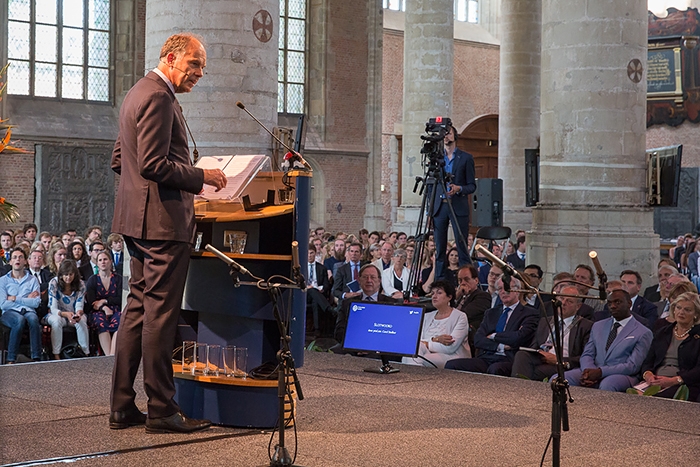
Rector Carel Stolker welcomed all the new students.
Digital revolution
Rector Magnifcus Carel Stolker welcomed all the new students. He mentioned many global concerns such as terrorism and climate change. The world needs universities more than ever, and it is the students who, as the new generation, will have to help resolve these problems, Stolker stated. One of the challenges is the global digital revolution. He referred to the plan, ‘The Digital Society’, drawn up by the Dutch universities within the Association of Universities in the Netherlands (VSNU). ‘If we want to have close links between society and technology, new technical knowledge has to be integrated with knowledge about economic, socio-economic, legal, psychological and cultural factors.’
Combatting human trafficking
Many of our Leiden researchers are involved in the search for this knowledge, the Rector stressed. Medical researchers, for example, are working together with social scientists to develop a data infrastructure that will provide e-coaching for chronic patients. Philosophers are researching ethical issues in the digital society. Criminologists and legal specialists are studying how children can be better protected against online child abuse. And data scientists are using trace evidence to map human trafficking.
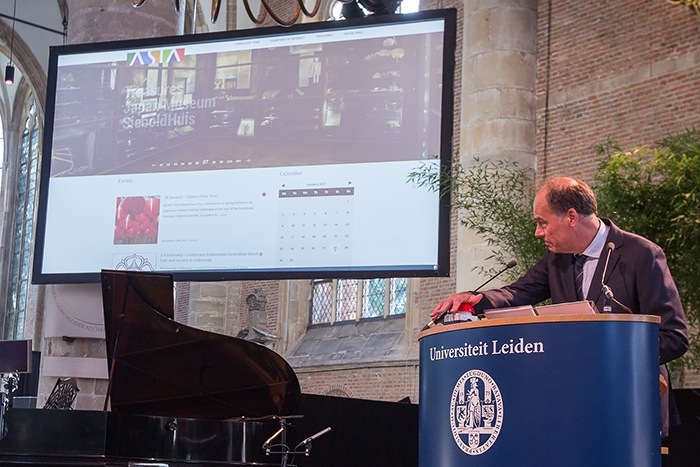
Carel Stolker opened the Leiden Asia Year by pushing a red button.
Leiden Asia Year
Next, Stolker introduced a very different subject: 2017 will be the Leiden Asia Year. By pressing a red button, he opened the new website: www.leidenasiayear.nl. This year of cultural activities on the theme of Asia was prompted by the opening of the Asian Library in 2017, which will house all the important Asiatic collections under one roof. And just as with the digital revolution, all our faculties have expertise in the field of Asia and there are important partners outside the University, such as the museums in Leiden.
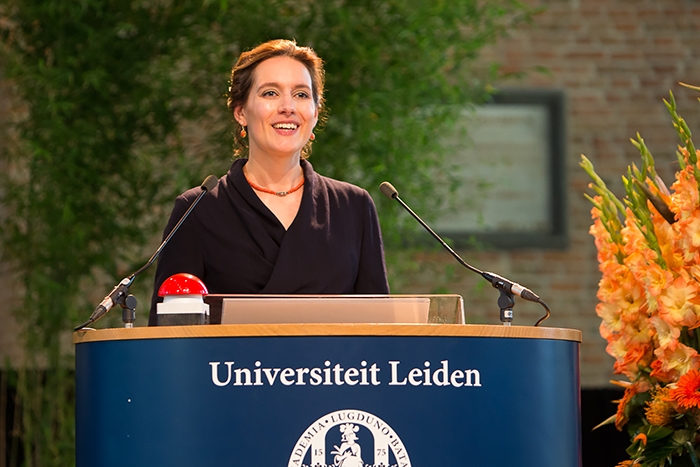
For the coming year, Kim Beerden may call herself the best lecturer of Leiden University.
Kim Beerden wins Teaching Prize
The LUS Teaching Prize was awarded to university lecturer in Ancient History Kim Beerden. For the coming year she may call herself the best lecturer in the University. The prize is an initiative of the Leiden University Student Platform (LUS), and is presented annually. According to LUS chairman Mikal Tseggai, Beerden is ‘a lecturer who knows her subject through and through and who is always committed to improving her teaching and inspiring her students.’
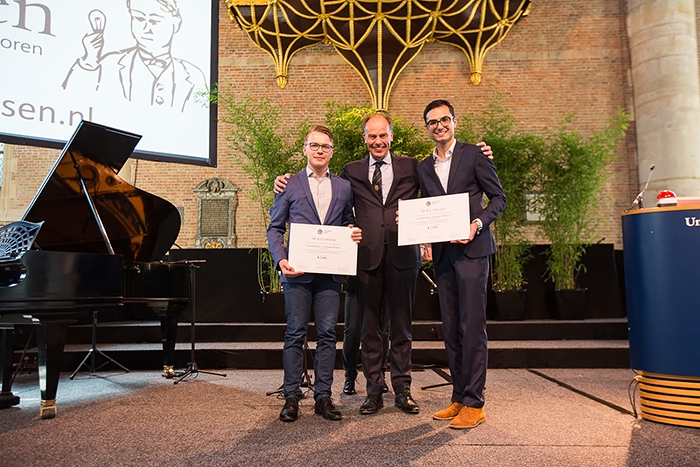
The Mr. K.J. Cathprijs was presented to the Edisen Foundation, set up by Christophe Mombers (left) and Arian Khoshchin (right).
Cath Prize for lectures in care homes
During the ceremony, Rector Magnificus Carel Stolker presented the Mr. K.J. Cath Prize to the two students, Christophe Mombers and Arian Khoshchin, who set up the Edisen Foundation. Edisen organises lectures in care homes. The elderly and those who are dependent on care can attend lectures on such topics as the new insights on sleep, optical illusions and virtual reality. The foundation only started last year and already it offers many different lectures and is active in other university cities. The Cath Prize is intended for staff or students who show Leiden University in a positive light.
Video
